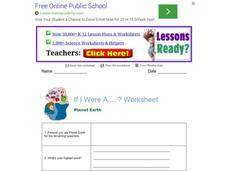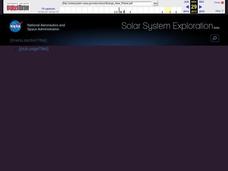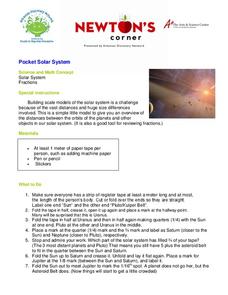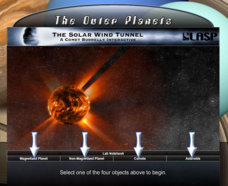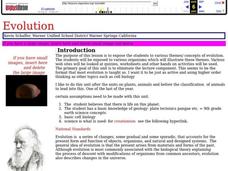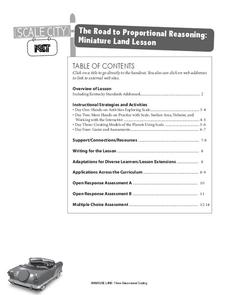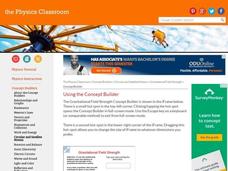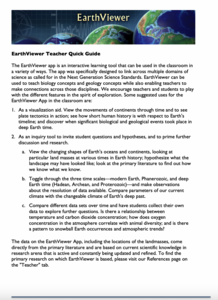Curated OER
Discover the Planets
Third graders research the planets. In this science instructional activity, 3rd graders create PowerPoint presentations over a planet. Students present their findings.
Curated OER
If I Was A...? Worksheet: Planet Earth
In this writing about Earth learning exercise, 5th graders pretend they are Planet Earth and then use their knowledge of Earth to answer the questions.
Curated OER
Strange New Planet
Students choose a spherical object to decorate with stickers, scents, etc to make it interesting. They write a key to the features for future explorers. Students use viewers to observe mystery planets. Students simulate NASA missions by...
Curated OER
A Day at the Beach: How to Keep Our Planet Clean
Young scholars write a persuasive essay based on cleaning up the coast and other philanthropic values. In this writing lesson, students determine what is needed in order to keep the planet clean, and offer solutions to the International...
Curated OER
The Solar System - A Review
Students analyze their knowledge about the solar system. In this solar system review lesson, students look at a picture of the solar system on the SMART Board, name them in order, and are able to identify the sun as the center. They...
University of Colorado
Star Light, Star Bright? Finding Remote Atmospheres
People might be able to breath there. Learners view a simulation of a planet passing in front of a star. Using data from occultations of planets with known types of atmospheres, scholars determine whether the simulated planet has an...
Curated OER
Sizing Up The Solar System
Students investigate and design various models of size and distance related to the solar system. They work together to build a solar system model. The models should focus on distance and scale. They don't include moons or satellites in...
Simply Worksheets
Solar System Quiz
In this space science learning exercise, students take an eight question quiz that contains multiple choice, short answer and true or false questions. All of the questions are based on facts about the solar system.
Earth Day Network
Healthy Earth, Sick Earth
Earth is sick and needs our help! Read the children's book Planet Earth Gets Well to explain the various problems facing the planet, discussing what young conservationists can do to heal the planet along the way. A great Earth Day...
Curated OER
Pocket Solar System
Motivate your class with this lesson. Learners explore the solar system and practice working with fractions using this resource. They construct scale models of our solar system, and use fractions to correctly configure the solar system...
NASA
Space Images
As technology advances, so does our understanding of the universe around us. Thanks to the Hubble Telescope, Mars rovers, and other high-resolution cameras, there are amazing photographs of celestial bodies, planets, comets, and more...
Curated OER
Our Intriguing Star, the Sun!
Explore the sun in a lesson plan about space. The lesson spans ten weeks, with students performing activities to answer weekly questions about the Sun and Earth.
University of Colorado
Is There Life on Earth?
To find life on another planet, scientists look for gases (atmosphere), water, and temperatures that are not extreme. In this activity, groups of pupils become "Titan-ians," scientists who want to explore Earth for possible life forms....
Laboratory for Atmospheric and Space Physics
The Solar Wind Tunnel
The winds of change are blowing in our very own solar system! But what makes some heavenly bodies more affected by solar winds than others? Pupils discover the concept of magnetic forces at work in space in this attractive interactive,...
American Museum of Natural History
Field Trip Mars
Fly around the Martian surface. Pupils view a presentation on the planet Mars featuring a flyover that shows different views of the surface where rovers have landed and explored on different missions. As individuals watch the images, the...
Curated OER
Evolution
Explore the concept of evolution and cell biology; your class can work in groups to use the internet to view websites on evolution, take a quiz, and complete a lab activity.
Keep it Simple Science
The Earth in Space
Skim the surface of the earth with this brief, compact, summary of outer space. The sun, stars, galaxies, planets, and phases of the moon can be found in this all-in-one resource. Seventh graders will enjoy these simple worksheets to do...
Kentucky Educational Television
The Road to Proportional Reasoning
Just how big would it really be? Young mathematicians determine if different toys are proportional and if their scale is accurate. They solve problems relating scale along with volume and surface area using manipulatives. The last day of...
McGraw Hill
Kepler's Third Law Interactive
Common sense says that the farther a planet is from the sun, the longer the orbit. Kepler turned common sense into his third law by quantifying this relationship. Classes explore Kepler's Third Law through an interactive tutorial. They...
McGraw Hill
Solar System Builder
Create your own solar system using a simulation. Young scientists explore the components of a stable solar system through trial and error. Using the simulation, they place planets and watch as they orbit safely or cause fatal collisions.
Virginia Department of Education
Scientific Notation
Writing a number is all in the notation. The resource introduces the class to scientific notation. Pupils learn the process of taking a very large or small number in standard form and write it in scientific notation. To practice,...
Physics Classroom
Gravitational Field Strength
Budding scientists fall hard for a gravitational field strength activity! Physics pupils compare the masses and distances relative to the center of planets using an interactive from a Circular and Satellite Motion series. Individuals...
Howard Hughes Medical Institute
Distribution of Elements in Earth’s Crust
How do scientists know the difference between a meteorite from space and a regular rock from the earth? Scholars read a passage and answer comprehension questions about the creation of the solar system. They extrapolate the main ideas to...
Howard Hughes Medical Institute
Classroom Activities: EarthViewer
The spot you are standing in right now—how did it look 2,000 years ago, one million years ago, or even four billion years ago? Scholars use a model of Earth throughout history to learn about continental drift, climate change, changes in...
Other popular searches
- Inner and Outer Planets
- Worksheets Planets
- Paper Mache Planets
- Inner Planets
- Nine Planets
- The Planets
- Imaginary Planets
- Sun and Planets
- Stars and Planets
- Planets Outer Space
- Planets and Astronomy
- Outer Planets



